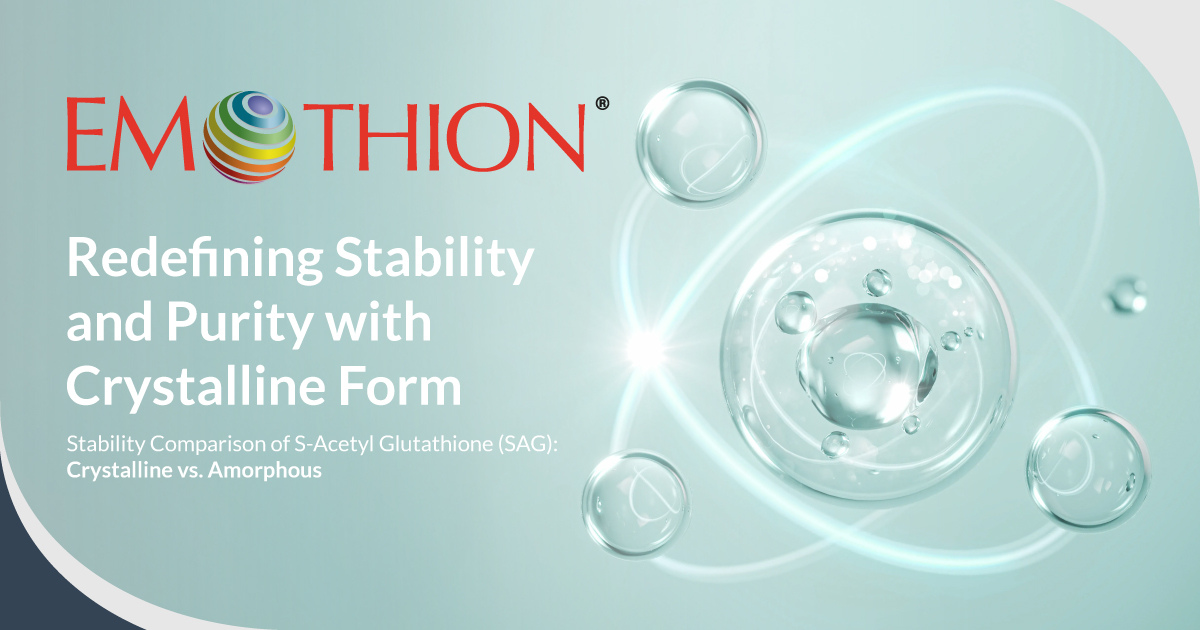What is Glutathione?
Reduced glutathione, commonly called GSH, is a tripeptide composed of three amino acids: glutamine, cysteine, and glycine. It is renowned for its role as a powerful antioxidant within the body, earning it the title "the master antioxidant."
GSH is crucial in minimizing oxidative stress, a condition characterized by the imbalance between the body's free radicals (reactive oxygen species) and antioxidants.
Free radicals are unstable molecules that can cause cellular damage, leading to various conditions and aging.
Glutathione's benefits include its ability to neutralize these free radicals, stopping them from harming cells and tissues.
What is Glutathione? What Role does Glutathione have in Human Health?
Detoxification
Glutathione (GSH) is integral to the body’s detoxification processes. It binds to harmful substances like heavy metals, pollutants, and metabolic byproducts, transforming them into less harmful forms for easier excretion. This detoxification primarily occurs in the liver, where GSH conjugates with toxins to facilitate their removal, thus protecting the liver from oxidative damage.
Cellular Protection
GSH protects cellular components from oxidative damage by directly reducing peroxides and regenerating other antioxidants like vitamins C and E back to their active forms. This regeneration maintains a robust antioxidant defense system within cells. Additionally, glutathione peroxidase, an enzyme reliant on GSH, protects cells from oxidative stress.
Regulation of Cellular Functions
Beyond its antioxidant properties, GSH is involved in various cellular functions, including protein synthesis, enzyme activation, and programmed cell death. It helps regulate cellular redox signaling, crucial for cell proliferation and differentiation. These functions underscore the essential role of GSH in maintaining cellular health and function.
OUR GLUTATHIONE RANGE
Why is Glutathione so Important?

Our life conditions impact our natural glutathione level, which depletes over time.
Reduced glutathione (GSH) deficiency is one of the primary causes of cellular aging and reduced life expectancy. Internal (stress, infection) and external (pollution, drugs, diet) factors can deplete GSH levels in the body.
GSH is a pivotal molecule in the body’s defense against oxidative stress and its associated adverse effects. Its benefits include supporting the immune system, aiding in detoxification, protecting cells from damage, and regulating essential cellular functions.
Adequate GSH levels can help the body better manage oxidative stress and maintain optimal health. Dietary sources, supplements, and medical treatments can provide this.
HOW DOES GLUTATHIONE WORK?
Glutathione is a powerful antioxidant that is crucial in maintaining cellular health by neutralizing reactive oxygen species (ROS). Its global mechanism of action involves its ability to scavenge free radicals and detoxify harmful molecules, thus protecting cells from oxidative damage.
ROS production during metabolic processes can damage cellular components such as DNA, proteins, and lipids. Glutathione acts by donating electrons to these unstable molecules, rendering them harmless. This process is essential for inhibiting oxidative stress, which can lead to chronic inflammation, cellular dysfunction, and various conditions.
Furthermore, glutathione helps regenerate other antioxidants, such as vitamins C and E, enhancing the body’s overall antioxidant defense system. Once glutathione neutralizes ROS, it is converted to its oxidized form, glutathione disulfide (GSSG), which is then recycled back into its active form, maintaining a balance in the cellular environment.
This antioxidant mechanism of glutathione is critical for various health aspects. For instance, in the skin, it helps stop photoaging and damage from UV exposure. In the brain, it protects against neurodegenerative changes by reducing oxidative stress. Thus, the universal action of glutathione as an antioxidant is fundamental to its diverse health benefits across different body parts.
Are All Glutathione the Same?
All glutathione supplements are not equal. Traditional glutathione tablets face significant challenges, including slow and limited absorption, enzyme degradation, and poor cellular uptake. This results in only about 30% effective glutathione (GSH) availability in the body. This low efficacy means that the glutathione benefits of regular supplements are limited.
In contrast, S-Acetyl-Glutathione offers a superior alternative. Protected by an acetyl group, this form resists enzymatic degradation, ensuring faster and more direct oral absorption. Upon de-acetylation in the body, it becomes fully effective glutathione, achieving 100% potential bioavailability.
This enhanced form is easily transported to cells, providing a higher antioxidant effect. S-Acetyl-Glutathione guarantees quality and purity, making it a more effective option for those seeking the benefits of glutathione supplementation. Whether you’re considering glutathione uses for skin or other health benefits, S-Acetyl-Glutathione stands out as the top choice.
HEALTHY HINTS: BASICS OF GLUTATHIONE
- COMPOSITION: TRIPEPTIDE COMPOSED OF GLUTAMINE, CYSTEINE, AND GLYCINE.
- ROLE: MASTER ANTIOXIDANT, NEUTRALIZES FREE RADICALS TO STOP CELLULAR DAMAGE.
- FUNCTIONS: SUPPORTS DETOXIFICATION, CRUCIAL FOR LIVER HEALTH AND TOXIN REMOVAL.
- CELLULAR PROTECTION: REDUCES OXIDATIVE STRESS, SUPPORTS IMMUNE FUNCTION, AND MAINTAINS CELLULAR HEALTH.
- REGULATION: REGULATES REDOX SIGNALING, PROTEIN SYNTHESIS, AND CELL DEATH PATHWAYS.
- MECHANISM: DONATES ELECTRONS TO NEUTRALIZE REACTIVE OXYGEN SPECIES, REGENERATES OTHER ANTIOXIDANTS.
- SUPPLEMENTATION: S-ACETYL-GLUTATHIONE OFFERS SUPERIOR BIOAVAILABILITY AND EFFICACY COMPARED TO TRADITIONAL FORMS.
- BENEFITS: GLUTATHIONE BENEFITS THE SKIN AND BRAIN AND ACTS AS A GLOBAL ANTIOXIDANT BY PROTECTING AGAINST OXIDATIVE DAMAGE.

Glutathione in Neuroprotection
Glutathione, a crucial brain antioxidant, protects against oxidative stress by neutralizing Reactive Oxygen Species (ROS). It helps maintain the balance between ROS production and antioxidant defenses, which are vital for inhibiting oxidative damage to cerebral cells. By reducing oxidative stress, glutathione mitigates neuroinflammation, supporting overall brain health and potentially preserving neurocognitive function against age-related decline and neurological issues.


Beauty from Within
Skin undergoes chronological and photoaging, accelerated by sun exposure-induced ROS production. This oxidative stress contributes to conditions like acne vulgaris. Glutathione (GSH), an essential antioxidant in skin, protects against ROS damage and influences melanin production. Higher cysteine levels in GSH promote pheomelanin production, potentially lightening skin tone by affecting the eumelanin-pheomelanin ratio, crucial for determining skin color.
Global Antioxidant
Glutathione is a vital antioxidant and is crucial for immunity and liver detoxification. It combats oxidative stress by neutralizing free radicals, supporting immune function, and protecting liver cells from damage. It also aids in detoxifying harmful substances, enhancing liver health and overall metabolic processes. Its presence is essential for maintaining cellular integrity and optimal physiological functioning, highlighting its significance in health and wellness.

HOW CAN GLUTATHIONE BE OBTAINED?
Glutathione can be obtained through a variety of foods rich in its precursor amino acids: cysteine, glutamine, and glycine. Foods such as lean meats, poultry, fish, eggs, dairy products, legumes, nuts, seeds, and cruciferous vegetables like broccoli and Brussels sprouts are excellent sources. These foods support the body’s natural production of glutathione, a potent antioxidant crucial for cellular defense against oxidative stress. Additionally, consuming sulfur-rich foods like garlic and onions can further enhance glutathione levels. While dietary intake plays a significant role, supplements containing glutathione precursors or liposomal formulations are also utilized to support optimal antioxidant function in the body.
Glutathione in Food Supplements
While supplementation with reduced glutathione can be beneficial, there are limits and considerations to its effectiveness. Reduced glutathione taken orally may have limited absorption due to a breakdown in the digestive tract. Moreover, membrane transport mechanisms can hinder its ability to enter cells directly. Therefore, strategies like using reduced glutathione precursors may enhance absorption and effectiveness, addressing some limitations associated with direct GSH supplementation.
S-acetyl glutathione is a precursor of glutathione, which releases the active compound after biological activation directly in our cells. It also works as a GSH replenisher.
The acetyl group protects the glutathione molecule during digestion and supports its effective absorption into cells, making S-acetyl glutathione a promising option for natural support of antioxidant defenses and overall health.
Related Glutathione news and events

- Emothion®
- News
- Wellness & Immune
- Apr 08, 2025
Emothion® Webinar Explores the Science for Skin Health
Gnosis by Lesaffre recently hosted a highly informative webinar titled "Emothion® Skin Health Redefined:...

- Emothion®
- News
- Wellness & Immune
- Mar 31, 2025
Crystal Clear Benefits with Emothion®
Emothion® is the patented crystalline form of S-acetyl-glutathione, a clinically studied, orally stable, and...

- Emothion®
- News
- Wellness & Immune
- Mar 12, 2025
Safety of S-Acetyl Glutathione confirmed for food and dietary supplements
Celebrating a new milestone: Safety assessment of S-Acetyl Glutathione for food and dietary supplement...


 Cognition
Cognition



